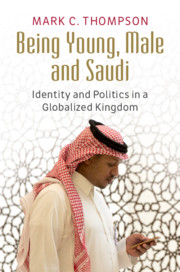Book contents
- Being Young, Male and Saudi
- Being Young, Male and Saudi
- Copyright page
- Dedication
- Contents
- Acknowledgements
- Abbreviations
- Introduction and Background
- 1 What Is Saudi? Identity, Religiosity and Generational Divides
- 2 The Saudi ‘Social Contract’ Under Strain: Employment, Housing and Healthcare
- 3 The New Media Revolution, Public Opinion and the Relationship between the Governing and the Governed
- 4 Education, Societal Transformation and Globalization
- 5 Masculinity, Gender Relations and Marriage
- 6 Distrust, Fault Lines and Recreation
- 7 Saudi Vision 2030 and National Development
- Conclusion
- Bibliography
- Index
5 - Masculinity, Gender Relations and Marriage
Published online by Cambridge University Press: 12 September 2019
- Being Young, Male and Saudi
- Being Young, Male and Saudi
- Copyright page
- Dedication
- Contents
- Acknowledgements
- Abbreviations
- Introduction and Background
- 1 What Is Saudi? Identity, Religiosity and Generational Divides
- 2 The Saudi ‘Social Contract’ Under Strain: Employment, Housing and Healthcare
- 3 The New Media Revolution, Public Opinion and the Relationship between the Governing and the Governed
- 4 Education, Societal Transformation and Globalization
- 5 Masculinity, Gender Relations and Marriage
- 6 Distrust, Fault Lines and Recreation
- 7 Saudi Vision 2030 and National Development
- Conclusion
- Bibliography
- Index
Summary
In order to understand contemporary Saudi society, it is imperative to focus on local contexts, particularly as Saudi society is not a homogeneous entity. Local context does not necessarily refer to the Kingdom as a unitary body, but rather to specific constituencies and regional areas. This comprehension of diverse Saudi societies is more nuanced and expansive than the traditional perspective of a relatively homogeneous Saudi society as it allows for a greater variation in the study of young Saudi male perceptions of masculinity, gender relations and marriage in everyday life. This chapter discusses perceptions of masculinity, attitudes to gender relations and the vexing problems of making a ‘good’ marriage as related to accepted Saudi socio-cultural norms. In fact, many young men maintain that a Saudi ‘social dictatorship’ exists, one based on historical socio-tribal attitudes and customs rather than solely Islamic jurisprudence and religious norms. Indeed, there is widespread recognition that these socio-cultural norms frequently govern the way ‘things are supposed to be’ in the community. Failure to follow these accepted practices can lead to family conflict and, significantly, ‘loss of face’ within society.
Keywords
- Type
- Chapter
- Information
- Being Young, Male and SaudiIdentity and Politics in a Globalized Kingdom, pp. 196 - 235Publisher: Cambridge University PressPrint publication year: 2019

